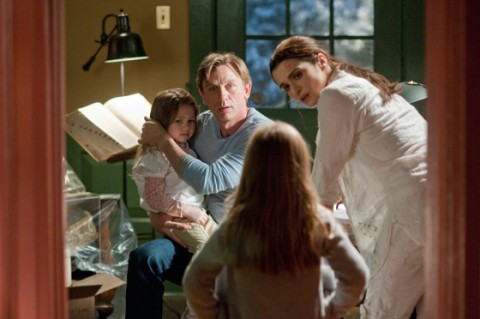Dream House

Universal released Dream House without advance screenings, so critics weren't inclined to treat it seriously. The studio interfered with the movie so much that the director, Jim Sheridan, wanted to take his name off it. But though the movie is confused, it contains beautifully conceived sequences that suggest a genuine vision.
Daniel Craig plays Will Atenton, who retires from his publishing job to spend more time with his family—his wife, Libby (Rachel Weisz), and their two little girls. They have just relocated to a small Connecticut town. Only after they've settled in do they learn that the last family to live in their house died violently and that the only survivor, the father, was the suspected killer and wound up in a psychiatric institution. Now, on the fifth anniversary of the event, it seems that someone has been watching the house.
Read our latest issue or browse back issues.
David Loucka's script builds up to a surprise like the ones in mysteries such as The Sixth Sense, Shutter Island and The Others. When you start to catch on, the plot at first seems hokey. But as the movie continues to develop, you start to realize that it's not just a twist but a genuine psychological revelation—that the picture is considerably more interesting than it might have seemed.
The most obvious evidence of studio interference comes late in the movie: the ending is sentimentalized, and there are other scenes that one might guess aren't scenes Sheridan intended. And the screenplay suffers from the unhappy tendency of movies of this stamp to present scenes that baffle us until we get to the twist. But Sheridan's use of the camera to suggest voyeurism and an unsettled point of view—working in tandem with the almost hallucinatory cinematography by Caleb Deschanel—suggests a deeply ominous sense of restlessness and dislocation, which pulls emotionally against the scenes of Will with his family.
As the movie goes on, sorrow pools under the familial exchanges and the tragedy that haunts this house begins to cross into the Atentons' lives. Messed up as it is, Dream House lingers; you may find yourself replaying in your head the strange, poignant scenes between Will and the other characters—Ann Patterson, a neighbor (Naomi Watts), and her teenage daughter (Rachel Fox). The movie succeeds in ways that transcend the narrative premise—and that explain what Sheridan must have seen in the material.
Sheridan works affectingly with his superb trio of leading actors. Both Weisz and Watts give finely shaded performances, and Craig is remarkable—though it's impossible to explain how without revealing too much of the plot. Dream House deserves a better chance with viewers than the studio was willing to afford it. It's a horror story grounded in the genuine horror of loss and mourning.






